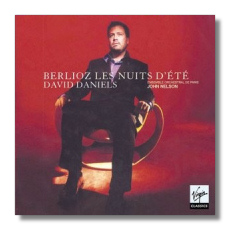
The Internet's Premier Classical Music Source
Related Links
- Berlioz Reviews
- Latest Reviews
- More Reviews
-
By Composer
-
Collections
DVD & Blu-ray
Books
Concert Reviews
Articles/Interviews
Software
Audio
Search Amazon
Recommended Links
Site News
 CD Review
CD Review
Hector Berlioz

Les Nuits d'été
- Hector Berlioz:
- Les Nuits d'été
- Les Troyens: Pantomime
- Maurice Ravel:
- Cinq Mélodies populaires grecques
- Pavane pour une Infante défunte
- Gabriel Fauré:
- En sourdine
- Mandoline
- Clair de lune
- Elégie pour violoncelle et orchestre
David Daniels, countertenor
Guillaume Paoletti, cello
Ensemble Orchestral de Paris/John Nelson
Virgin Classics 545646-2 DDD 68:56
There's a precedent for having at least part of Berlioz's song-cycle Les Nuits d'été sung by a man, but I wager that this is the first time it's been sung by a countertenor in its entirety. David Daniels is no ordinary countertenor, of course, and having made an impression in the Baroque repertoire, it shows admirable chutzpah for him to have taken on Berlioz. And why not? Most of Gautier's texts appear to present a male's perspective anyway. More importantly, Daniels is quite capable of meeting Berlioz's vocal demands, and of bringing something new to the music interpretively. (I believe that Daniels has transposed at least some of the songs to a lower key, however.) Pervaded by ghosts, cemeteries, and gloomy lagoons, Les Nuits d'été is definitely morbid, and Daniels seems to relish its eeriness, a quality only emphasized by his voice, which can sound, well, hauntingly disembodied. He doesn't sing this cycle as meaningfully and as magnificently as Crespin, nor does he have her assertiveness, nor her innate feeling for the sound of the French texts, yet, in the end, Daniels's version can't be compared with anyone else's, and it is a must for anyone who loves this music. He is no less interesting in Ravel's lusty cycle of "popular Greek songs" – one can hear him almost smacking his lips in anticipation as he exhorts his bride to awaken in the first song. The three Fauré chansons, arranged by Gil Shohat, also come off very well, and the new (?) orchestrations are idiomatic and effective.
It was a smart idea to insert non-vocal interludes into this program. Nelson, a canny conductor in the vocal items, proves his distinction again in the non-vocal ones, particularly in the Pantomime from Act Two of Les Troyens. These are restrained and noble readings; here's an Infanta whose royal blood has not been forgotten, for example. Only the popular Fauré Elégie comes off as a little too cool for its own good.
It's only May, but I have no doubt that this CD will be one of 2004's most provocative and interesting releases.
Copyright © 2004, Raymond Tuttle


















